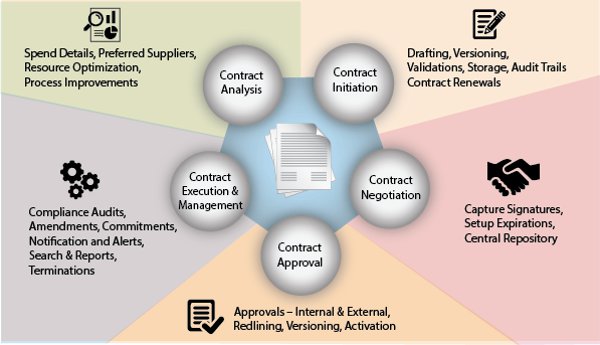
Contracts are essential for enterprises to create, maintain and sustain a relationship with employees, customers, partners, and vendors. Contracts affect company’s bottom line due to their involvement in revenue and expenses and processes around these contracts should be precise, workflow-centric and automated. Let’s discuss on how a contract management solution can become an integral part of IT landscape that can help automate and streamline processes around contracts. It is a process of managing complete contract lifecycle – capture, authorization, negotiation, approval, execution, analysis, renewals, audit and amendment of contracts with contracting parties for the purpose of higher compliance at lower business risks.
According to Gartner, few companies have actual control over their processes and suffer the costly consequences. High valued contracts with renewals can cost more to enterprises if the processes are not streamlined. Current scenario states that companies having a large number of active contracts should look for a stable and scalable contract management system for a flawless business execution.
Challenges faced by enterprises at different stages of contract lifecycle:
- Tracking the right contract at the right time is the biggest challenge
- Missing deadlines during the contract renewal time leads to additional cost
- Identifying the person who is responsible for managing the contracts
- Fetching status reports of all contracts during audit time
- Analysing multiple contracts across multiple departments and vendors
- Cost analysis and trend across segments
One of the biggest challenges is that contracts go through multiple applications from creating to signing to storing that creates room for errors.
Contract Management solution – An open source way
Open Source technologies can help enterprise to solve these challenges and can be a backbone to create the contract management solution that can help to handle complete contract lifecycle. Let’s understand the five steps of a contract lifecycle briefly:
1. Contract Initiation – Draft the contract, add version, and store it
2. Contract Negotiation – Add expiration and renewal terms
3. Contract Approval – Send it for approval, redline and revise it
4. Contract Execution and Management – Search & track the contract, send alerts
5. Contract Analysis – Analysis of cost, resources and processes
5 steps of contract lifecycle
Here, Enterprise Content Management (ECM) and Business Process Management (BPM) systems are suitable to create process-driven and workflow centered solution to manage contracts. While ECM and BPM work as core systems, Dashboard and Analytics module will be helpful to analyze the contracts and create an informative dashboard.

Integration of these Open Source technologies can provide array of features which are essential to creating any contract management:
Let me walk you through some of the features/integrations that will make Open Source Contract Management System effective:
1. Versioning and Authoring of Contracts
Contracting parties share several versions of contracts and contract managers & legal executives rely heavily on those versions. They need flawless integration of the system with word processors. Open Source ECM provide this integration with little customization.
2. Dashboard and Reports
When you log in to the system, you don’t want to miss the date of renewal of contracts or giving approval to some important contracts. A powerful dashboard provides easy access to essential information and the reporting feature helps to track contracts and maintain details for decision makers.
3. Document Management
Contract managers face a major challenge to identify the person holding the contract and want to know the timeline for document deliverables. Real-time information with role-based views is essential for taking appropriate actions.
4. Enterprise Search
Contract Management is a process of managing contracts, invoices, regulatory approvals and other documents. These documents need to be indexed and stored properly in the content repository. For performing full-text search on these documents the system should have seamless integration with metadata search.
5. Milestone Alerts
Processes around contract management are time bound. That’s why alerts are an important feature to add in the system to remind people of taking decisions on a timely manner.
6. Contract Review and Approval Automation
This part is a bottleneck in the system. Contracts go through many workflow stages with changes in contracting parties. The system should be flexible enough to accommodate changes in workflow routing process as well as gets integrated for reminder alerts.
7. Digital Signature
A secure digital signature is core feature to ensure sender’s identity and authenticity of the document. Integration with digital signature will automate the process from start to finish without wasting papers.
As Gartner stated, Contract Lifecycle Management is no longer a nice-to-have capability: It’s a priority. Contract Management is becoming high priority need in enterprises to tackle their contract management challenges, and Open Source can play a major role in streamlining the process.











































































